cockatoo eggs
$40.00 Original price was: $40.00.$30.00Current price is: $30.00.
Cockatoo eggs are the eggs laid by female cockatoos for the purpose of reproduction. Cockatoos, like other birds, reproduce by laying eggs, which are then incubated until they hatch.
SKU: N/A
Category: egg
Tags: at what age can galah cockatoos lay eggs, at what age do cockatoos stop laying eggs, at what age do umbrella cockatoos lay eggs, best temperature for a cockatoo egg, black cockatoo eggs, black cockatoo eggs for sale, black palm cockatoo egg price, black palm cockatoo eggs, black palm cockatoo eggs for sale, buy black palm cockatoo eggs, buy cockatoo eggs, buy cockatoo eggs online, buy cockatoo eggs uk, buy fertilized cockatoo eggs, can a year old galah cockatoo lay eggs, can cockatoos eat eggs, can cockatoos eat scrambled eggs, can cockatoos lay fertile eggs without mating, can male cockatoos lay eggs, can you eat cockatoo eggs, can you give a cockatoo an egg every day, candeling cockatoo eggs, candling cockatoo eggs, cockatoo bird eggs for sale, cockatoo butt egg signs, cockatoo egg, cockatoo egg day 10, cockatoo egg for sale, cockatoo egg for sale in tamil nadu, cockatoo egg hatching, cockatoo egg incubation, cockatoo egg incubation day 7, cockatoo egg incubation incubator got too warm, cockatoo egg laying, cockatoo egg laying behavior, cockatoo egg price, cockatoo egg size, cockatoo egg to development, cockatoo eggs, cockatoo eggs buy, cockatoo eggs for hatching, cockatoo eggs for sale, cockatoo eggs for sale australia, cockatoo eggs for sale california, cockatoo eggs for sale in bangalore, cockatoo eggs for sale in bangladesh, cockatoo eggs for sale in chennai, cockatoo eggs for sale in india, cockatoo eggs for sale in pakistan, cockatoo eggs for sale near me, cockatoo eggs for sale uk, cockatoo eggs for sale usa, cockatoo eggs for sale washington state, cockatoo eggs hatching, cockatoo eggs in pakistan, cockatoo eggs india, cockatoo eggs price, cockatoo fertile eggs for sale, cockatoo hatching eggs, cockatoo hatching eggs for sale, cockatoo how long does an egg take to hatch, cockatoo incubating eggs, cockatoo laying eggs, cockatoo laying eggs no male, cockatoo moluccan incubating egg, cockatoo painted goose eggs, cockatoo parrot eggs for sale, cockatoo parrot eggs for sale in pakistan, cockatoo umbrella in egg, cockatoos egg development, cockatoos egg development chart, cockatoos eggs for sale, cockatoos laying eggs, do both mael and female cockatoos sit on the eggs, do cockatoo birds lay eggs without a male bird around, do cockatoos lay eggs, do cockatoos lay empty eggs, do cockatoos lay unfertilized eggs, do cockatoos stop laying eggs what age, do healthy cockatoos lay eggs, egg bound cockatoo, egg whites for cockatoos, fake cockatoo eggs, female cockatoo egg laying and egg binding, female cockatoo eggs, female cockatoo laying eggs, female cockatoos lay eggs, female moluccan cockatoo laying eggs, female umbrella cockatoo laying eggs, fertile cockatoo eggs for sale, fertile cockatoo eggs for sale in california, galah cockatoo eggs for sale, goffin cockatoo eggs for sale, golden cockatoo fertile eggs, hat temperature will kill a cockatoo egg, hatching cockatoo eggs, how big is a cockatoo egg, how is a red tailed black cockatoo eggs looks like, how long do cockatoos lay eggs, how long do umbrella cockatoo eggs take to hatch, how long does a cockatoo egg take to hatch, how long does it take for cockatoo egg to form, how long does it take for cockatoo eggs to hatch, how many eggs can a cockatoo lay, how many eggs can the red tailed black cockatoo lays, how many eggs do cockatoos lay, how many eggs do cockatoos lay a year, how many eggs do cockatoos lay at a time, how many eggs does a cockatoo lay, how much money are cockatoo eggs, how often do cockatoos lay eggs, how often do umbrella cockatoos lay eggs, how often does a cockatoo lay eggs, how old are cockatoos when they lay eggs, how to care for a cockatoo egg, how to hatch a cockatoo egg, how to hatch cockatoo eggs, how to incubate a cockatoo egg, how to incubate cockatoo eggs, how to take care of cockatoo eggs, i need a fertile cockatoo eggs for sale, incubating cockatoo eggs, incubating umbrella cockatoo eggs, infertile cockatoo eggs, infertile cockatoo eggs mocha, inside a cockatoo egg, inside a cockatoo egg sketch, macaw cockatoo eggs, major mitchell cockatoo eggs for sale, male cockatoo laying eggs, moluccan cockatoo eggs, moluccan cockatoo eggs for sale, moulican cockatoo eggs, my cockatoo has laid an egg, my cockatoo is laying eggs, my cockatoo just laid an egg, my cockatoo keeps laying eggs, my cockatoo laid an egg, my rosebreated cockatoo laid an egg, my umbrella cockatoo laid an egg, palm cockatoo egg once every second year, palm cockatoo egg once every two years, palm cockatoo eggs for sale, red tailed black cockatoo eggs, rose breasted cockatoo eggs, rose breasted cockatoo eggs for sale, sulphur crested cockatoo eggs, sulphur crested cockatoo eggs for sale, temperature to incubate umbrella cockatoo eggs, umbrella cockatoo and eggs, umbrella cockatoo egg, umbrella cockatoo egg hatching, umbrella cockatoo egg incubation, umbrella cockatoo egg laying, umbrella cockatoo eggs, umbrella cockatoo eggs for sale, umbrella cockatoo eggs for sale in wa, umbrella cockatoo eggs for sale uk, umbrella cockatoo eggs price, umbrella cockatoo keeps laying eggs, umbrella cockatoo laying eggs, unfertile cockatoo eggs, what age do cockatoos lay eggs, what does a cockatoo egg look like, what happens to egg laying cockatoo, what to do when my cockatoo lays an egg, when do cockatoos lay eggs, when do cockatoos start laying eggs, when do cockatoos stop laying eggs, when do goffin cockatoo lay eggs, when does heartbeat develop in incubating cockatoo eggs, where can i buy a rose chested cockatoo egg, white cockatoo egg size, why did my cockatoo laid an egg, will a cockatoo bleed after laying an egg
Cockatoo eggs are the eggs laid by female cockatoos for the purpose of reproduction. Cockatoos, like other birds, reproduce by laying eggs, which are then incubated until they hatch. Here are some general facts about cockatoo eggs:
- Egg Production: Female cockatoos typically lay eggs as part of their reproductive cycle. The timing and frequency of egg-laying can vary between species and individuals. It’s important to note that cockatoos require specific conditions and appropriate mates to stimulate egg-laying behavior.
- Clutch Size: Cockatoo clutch sizes vary depending on the species. Generally, clutch sizes range from one to four eggs. Some species, such as the larger Moluccan Cockatoo, may have smaller clutch sizes, while others, like the Galah Cockatoo, may have larger clutch sizes.
- Incubation Period: After a female cockatoo lays her eggs, the incubation period begins. The duration of the incubation period varies depending on the species but generally lasts around 24 to 30 days. During this time, the parent birds take turns incubating the eggs to keep them warm and ensure proper development.
- Care and Protection: Cockatoo parents are responsible for caring for and protecting their eggs. They maintain the temperature and humidity of the nest, turn the eggs regularly, and provide proper nutrition to the developing embryos. The parents are highly dedicated to this task and take it seriously.
- Hatching and Chick Rearing: Once the incubation period is complete, the eggs start to hatch. The chicks emerge from the eggs and are initially helpless and rely on their parents for warmth, food, and protection. The parents continue to care for and feed the chicks until they are old enough to fledge and become independent.
| Cockatoo Egg | Black Palm Cockatoo, Moluccan Cockatoo, Galah Cockatoo, Umbrella Cockatoo |
|---|
Be the first to review “cockatoo eggs” Cancel reply
Related products
Sale!
Male & Female
$750.00 – $1,150.00
This product has multiple variants. The options may be chosen on the product page
Sale!
Sale!
Male & Female
$750.00 – $1,100.00
This product has multiple variants. The options may be chosen on the product page
Sale!
Sale!
Male & Female
$750.00 – $1,500.00
This product has multiple variants. The options may be chosen on the product page
Sale!
Male & Female
$750.00 – $1,150.00
This product has multiple variants. The options may be chosen on the product page




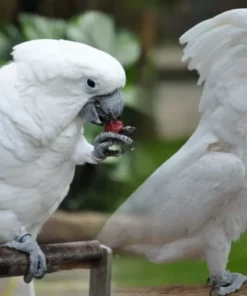
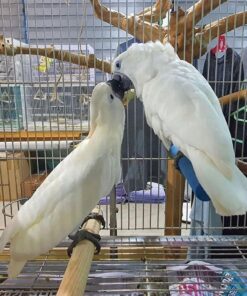

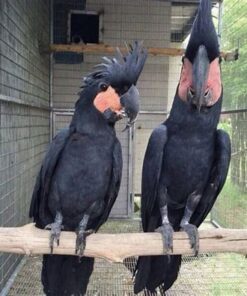
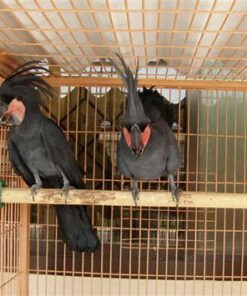


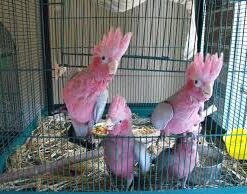


Reviews
There are no reviews yet.